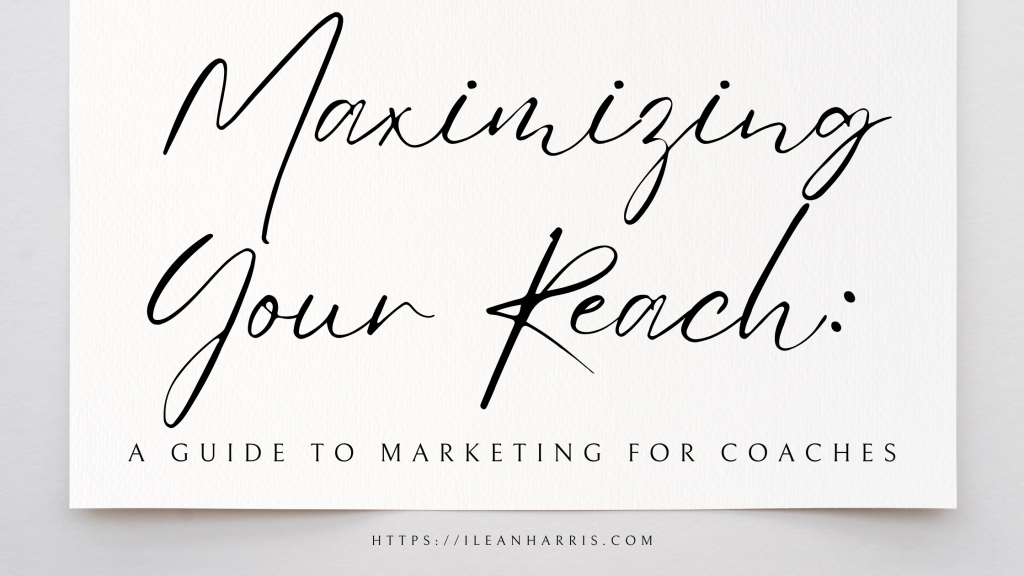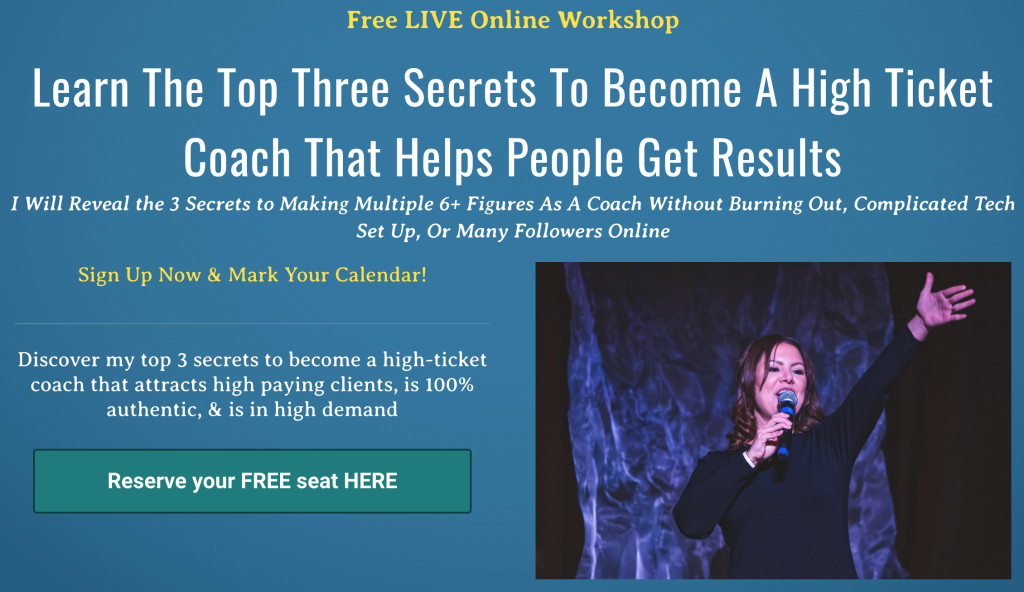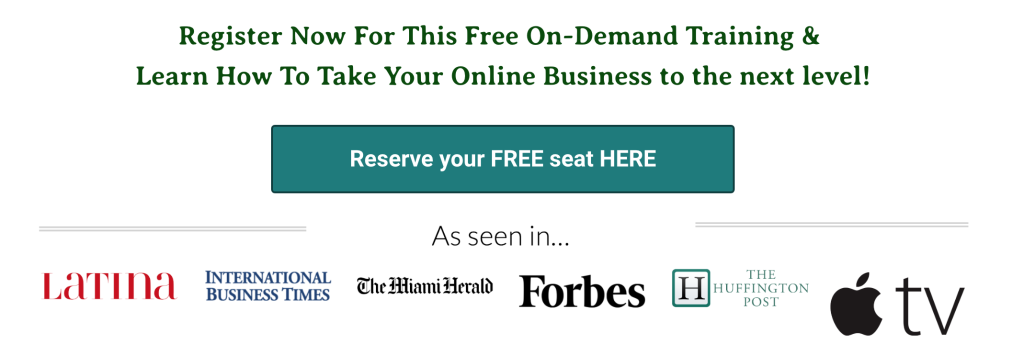
This post is all about marketing for coaches.
Marketing for Coaches
Marketing is an essential aspect of any coaching business, and it is critical for coaches to understand the most effective marketing strategies to reach potential clients.
In this guide, we will discuss how to maximize your reach as a coach and attract the right clients for your business.
- Know your target audience: It is essential to know who your target audience is and what they are looking for in a coach. This includes understanding their needs, wants, and pain points, as well as their preferences for communication and engagement. Once you have a clear understanding of your target audience, you can create a marketing strategy that is tailored to their needs and interests.
- Develop a strong brand: Your brand is what sets you apart from other coaches and attracts potential clients to your business. This includes developing a unique value proposition, creating a memorable logo and website, and consistently communicating your brand values and messaging.
- Utilize social media: Social media is a powerful tool for coaches to reach potential clients and engage with their target audience. This includes creating and updating profiles on platforms such as LinkedIn, Facebook, and Instagram, as well as using social media to share content, engage with your audience, and promote your business.
- Content marketing: Content marketing is an effective way to attract and engage with potential clients. This includes creating blog posts, articles, videos, and other forms of content that provide value and build your expertise. By creating valuable and relevant content, you can position yourself as a thought leader in your industry and attract potential clients.
- Networking: Networking is a critical aspect of marketing for coaches, as it allows you to connect with potential clients and other professionals in your industry. This includes attending events, participating in online forums, and building relationships with other coaches and referral partners.
- Offer a free trial or consultation: Offering a free trial or consultation is a great way to attract potential clients and showcase your coaching skills. This allows potential clients to experience your coaching style and approach, and it provides an opportunity for you to demonstrate your value and build trust.
- Continuously measure and adjust: Marketing is a dynamic process, and it is essential to continuously measure and adjust your strategies based on your results. This includes tracking your website traffic, social media engagement, and conversion rates, as well as using this information to refine your marketing strategies and maximize your reach.
In conclusion, maximizing your reach as a coach requires a comprehensive and strategic approach to marketing.
By understanding your target audience, developing a strong brand, utilizing social media, creating valuable content, networking, offering a free trial or consultation, and continuously measuring and adjusting your strategies, you can attract the right clients and grow your coaching business.
Read more about a coaching business plan here.
Marketing for Coaches with Social Media
Social media has become an essential tool for coaches to reach potential clients and build their brand. In this guide, we will discuss the most effective social media strategies for coaches to attract and engage with their target audience.
- Choose the right platforms: Not all social media platforms are created equal, and it is essential to choose the ones that are most effective for your target audience. For example, LinkedIn is a great platform for business and professional coaching, while Instagram is better for health and wellness coaches.
- Develop a consistent brand: Consistency is key when it comes to social media marketing, and it is essential to develop a consistent brand across all platforms. This includes using the same profile picture, bio, and messaging on each platform, as well as using the same tone and voice in your posts.
- Share valuable content: The key to successful social media marketing is to provide value to your audience, and this includes sharing valuable content. This can include blog posts, articles, videos, and other forms of content that provide insights and tips on topics related to your coaching specialty.
- Engage with your audience: Social media is not just about broadcasting your message, but it is also about engaging with your audience. This includes responding to comments and messages, asking questions, and building relationships with your followers.
- Use paid advertising: Paid advertising on social media can be an effective way to reach a wider audience and attract potential clients. This includes sponsored posts, targeted ads, and influencer marketing, and it is important to carefully target your ads to ensure they reach your desired audience.
- Measure and adjust: Social media is a dynamic platform, and it is essential to continuously measure and adjust your strategies based on your results. This includes tracking your engagement and reach, as well as using this information to refine your strategies and improve your results.
In conclusion, social media is a critical tool for coaches to reach potential clients and build their brand.
Read more about social media for business here.
By choosing the right platforms, developing a consistent brand, sharing valuable content, and engaging with your audience, you can attract clients consistently.
Marketing for coaches with email marketing
Email marketing is a cost-effective and results-driven strategy that can help coaches reach out to their target audience and build lasting relationships with them.
Read more about email marketing here now.
Here are some best practices for email marketing for coaches:
- Segment your email list: Segmenting your email list based on demographics, interests, and behavior can help you deliver more relevant and personalized content to your subscribers.
- Use a catchy subject line: The subject line is the first thing your subscribers see, so it should be attention-grabbing and relevant to the email’s content.
- Keep it simple and to the point: People receive a lot of emails, so keep your content simple and easy to read. Focus on delivering value to your subscribers, and make sure your message is clear and concise.
- Personalize your emails: Personalizing your emails with the recipient’s name, past purchases, and other relevant information can help build rapport and increase engagement.
- Test and optimize: Regularly test and optimize your email campaigns to see what works best for your audience. Use A/B testing to try out different subject lines, content, and calls to action to see what resonates with your audience.
- Offer value: Offer your subscribers valuable content, such as tips, advice, and exclusive offers. This will help build trust and loyalty and encourage them to stay subscribed to your email list.
- Include a clear call-to-action: Your emails should have a clear and specific call-to-action, such as signing up for a webinar or booking a session with you.
By following these best practices, coaches can effectively use email marketing to build relationships with their target audience, drive engagement, and ultimately grow their business.
Marketing for coaches with automated webinars
Automated webinars can be a powerful marketing tool for coaches to reach a large audience and deliver their expertise effectively.
Here are some best practices for using automated webinars in your coaching marketing:
- Identify your target audience: Before you start creating your webinar, make sure you understand who your target audience is and what their pain points and interests are. This will help you create a webinar that resonates with them.
- Choose an engaging topic: Select a topic that is relevant and interesting to your target audience. Consider creating a webinar that addresses a common problem that your target audience faces and provides a solution.
- Promote your webinar: Promote your webinar through your email list, social media, and other channels to reach as many people as possible. Offer a limited-time discount or a special bonus to encourage people to register.
- Create a high-quality presentation: Invest time and effort in creating a professional and engaging presentation that delivers your message clearly. Use images, videos, and other multimedia to keep your audience engaged.
- Use an automated webinar platform: Automated webinar platforms, such as EverWebinar and WebinarJam, allow you to pre-record your webinar and have it play automatically at specified times. This saves you time and allows you to reach a larger audience.
- Offer value: Make sure your webinar offers real value to your audience. Provide practical tips, actionable advice, and exclusive content that they can’t find anywhere else.
- Follow up with your audience: After the webinar, follow up with your audience to see how they liked it, answer any questions they may have, and offer them additional resources or services that can help them further.
By following these best practices, coaches can effectively use automated webinars to reach a large audience, build their brand, and grow their business.
Read more about webinars here now.
Marketing for coaches with video
Video marketing can be a highly effective way for coaches to reach their target audience and promote their services. Here are some best practices for using video in your coaching marketing:
- Identify your target audience: Before you start creating your video, make sure you understand who your target audience is and what their pain points and interests are. This will help you create a video that resonates with them.
- Choose a compelling topic: Select a topic that is relevant and interesting to your target audience. Consider creating a video that addresses a common problem that your target audience faces and provides a solution.
- Invest in high-quality production: Invest time and effort in creating high-quality video content. Use professional equipment and invest in good lighting and sound to make your video look and sound its best. (But do not discount how high quality your videos can be when made on your smart phone!)
- Promote your video: Share your video on your website, social media channels, and other platforms to reach as many people as possible. Consider running a paid advertising campaign to reach a wider audience.
- Keep it short and to the point: Attention spans are short, so keep your video short and to the point. Aim for 2-3 minutes or less, and make sure your message is clear and concise.
- Offer value: Make sure your video offers real value to your audience. Provide practical tips, actionable advice, and exclusive content that they can’t find anywhere else.
- Use a call-to-action: End your video with a clear and specific call-to-action, such as signing up for a newsletter or booking a session with you.
By following these best practices, coaches can effectively use video marketing to reach their target audience, build their brand, and grow their business.
This post was all about marketing for coaches.




